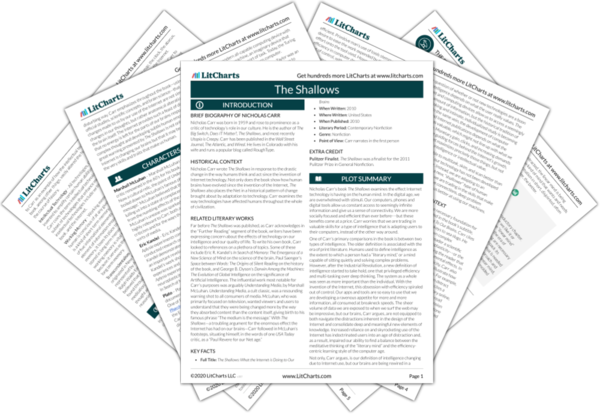A pervasive element of The Shallows is the role of efficiency in shaping and guiding the development of technology. To some extent all technologies––“intellectual” and otherwise––came into being because we wanted to make our lives easier, and thus more efficient. Primitive man’s use of tools stemmed from an innate desire to ease the work expended by the user and relocate effort onto the tool used. However, modern striving for efficiency in computer development, Carr warns, has spiraled out of control, with unintended results.
With computational speed no longer an impediment, the Internet has become a mechanism for the rapid-fire delivery of bite-sized content. The computer can now digitize, “slice and dice,” and update information at an unthinkable pace. Modern day devices are updated in near real-time with increasingly user-friendly interfaces, search engines like Google strive with religious zeal to catalogue the entirety of human information, and citizens of all ages check their social media feeds many times per minute. No longer hindered by computational speed limits, technology originally designed to make our lives easier—and thus free up our time––now preoccupies every waking moment.
Further, Carr argues, the majority of Net users are trapped by the Internet’s culture of relevance. The Internet now measures efficiency by content “freshness,” instilling in both publishers and users a preoccupation with staying up-to-date. The winning news feed or social media platform will be the one that delivers notifications that much faster. Carr points to a feedback loop between web publisher and user. We are sharing more, clicking more, and getting notified more because the websites and apps are increasingly effortless to use. At the same time, the resulting flood of instantaneous information forces users to stay constantly aware – to constantly scan their digital horizons – or else they will end up less up-to-date and knowledgeable than the people around them. Put another way, websites and apps can use the social pressure to stay relevant to keep their users constantly engaged – a vicious circle of constant distraction that is to the website and app’s own benefit, but leads to constant distraction and anxiety for the user. Carr therefore urges us to re-evaluate the true efficiency of tools and programs that claim to provide efficiency, but which do so not to make our lives easier but rather to survive in the brutally competitive arena of the net.
Efficiency, Speed, and Relevance ThemeTracker

Efficiency, Speed, and Relevance Quotes in The Shallows
Whether I’m online or not, my mind now expects to take in information the way the Net distributes it: in a swiftly moving stream of particles.
The way the Web has progressed as a medium replays, with the velocity of a time-lapse film, the entire history of modern media.
We don’t see the forest when we search the Web. We don’t even see the trees. We see twigs and leaves.
In arguing that books are archaic and dispensable, Federman and Shirky provide the intellectual cover that allows thoughtful people to slip into the permanent state of distractedness that defines online life.
In the choices we have made, consciously or not, about how we use our computers, we have rejected the intellectual tradition of solitary, single-minded concentration, the ethic that the book bestowed on us. We have cast our lot with the juggler.
As the psychotherapist Michael Hausauer notes, teens and other young adults have a “terrific interest in knowing what’s going on in the lives of their peers, coupled with a terrific anxiety about being out of the loop.” If they stop sending messages, they risk becoming invisible.
When it comes to the firing of our neurons, it’s a mistake to assume that more is better.
What we are experiencing is, in a metaphorical sense, a reversal of the early trajectory of civilization: we are evolving from being cultivators of personal knowledge to being hunters and gatherers in the electronic data forest.
The Net is making us smarter…only if we define intelligence by the Net’s own standards.
Every click we make on the Web marks a break in our concentration, a bottom-up disruption of our attention––and it’s in Google’s economic interest to make sure we click as often as possible.
The irony in Google’s effort to bring greater efficiency to reading is that it undermines the very different kind of efficiency that the technology of the book brought to reading––and to our minds––in the first place.
The Web’s connections are not our connections––and no matter how many hours we spend searching and surfing, they will never become our connections. When we outsource our memory to a machine, we also outsource a very important part of our intellect and even our identity.











